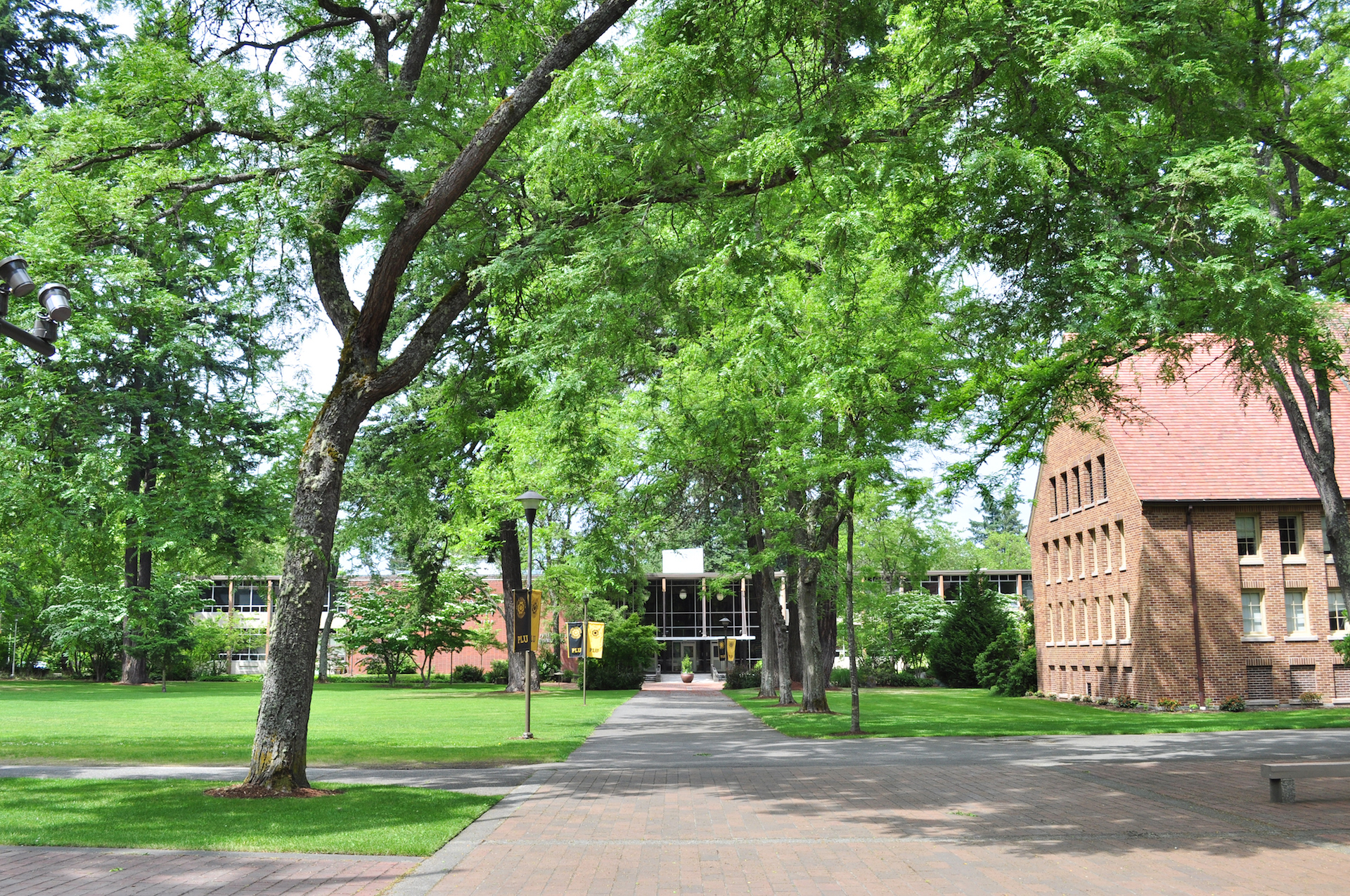By Ben Leschensky
Reporter
These are tumultuous times at Pacific Lutheran University.
That much was evident during a tense student forum on February 9th between members of the PLU community and the upper levels of administration. The well-attended Zoom forum – over 200 attendees – may have been silent to the ear, but the chat window told a story of student confusion, frustration, and anger. The source of tension? The convening of the Faculty Joint Committee (FJC), a group of PLU faculty members tasked with recommending academic program cuts and realignments as a result of financial strain on the university.
Rumblings of the FJC process have been percolating through university channels as of late, so Student Life and President Allan Belton called the forum to provide context and clarification on what’s actually happening. The forum featured panelists including Belton, Provost Joanna Gregson, VP of Student Life Joanna Royce-Davis, Dean of Social Sciences Anna Leon-Guerrero, and Chair of the Faculty Bridget Yaden.
The Forum
“Since FJC will affect all student’s academic lives, I feel disappointed that there is no room for our voices in this operation,” one PLU student wrote.
This sentiment was shared by many of the students who attended and participated in the Zoom chat. The majority of the chat questions and comments came from the same group of 10-15 individuals. Questions asked ranged from FJC transparency to funding decisions, to Diversity, Justice, and Sustainability (DJS) considerations to PLU’s identity. As the panelists’ discussions of the intricacies of the FJC process grew long, students also started questioning other, non-FJC related topics. One such topic was why athletes are seemingly getting preferential treatment over those involved in fine arts during this irregular school year.
For the panelists and moderator Gracie Anderson of ASPLU, the forum presented a tough task. The forum was designed so that the panelists had 30 minutes to go through their planned remarks on the FJC process, but it became clear early on that the remaining 30 minutes of Q & A would not be enough for the onslaught of questions. Belton, Anderson, and the other panelists did their best to answer as many questions as they could and grouped similar questions into single answers during the Q & A period. The panelists reiterated throughout the entire evening the unfortunate circumstances that led to the FJC needing to be called, but it was evident that they trusted the process and had confidence in PLU weathering this rough patch.
What is FJC and why is it here?
The Faculty Joint Committee process is introduced and thoroughly explained in the Faculty Handbook. As written in Section IV, Part X, Article 2, “In the event of demonstrable financial exigency or extraordinary circumstances, either of which may require the reduction or reallocation of tenured faculty positions, the university president, in consultation with the Board of Regents, the provost, and the faculty, shall initiate the reduction and reallocation procedures.”
The Committee itself, according to Dean Leon-Guerrero, “is composed of the members of three faculty-standing committees: Education and Policies, Faculty Affairs, and Rank and Tenure.”
This joint committee, with 20 faculty members total, represents each school or division at PLU, so equal visibility is given to all corners of PLU’s academic programs. The committee is tasked with making recommendations for cuts and realignments only – no final decisions. Final recommendations from the FJC go to President Belton, who then passes it along to the Board of Regents who ultimately make the official decisions.
The “financial exigency” mentioned in the Faculty Handbook is what prompted PLU’s process – and the university is not alone. As Provost Gregson said, “The story of FJC is both a national story and a PLU story.”
Institutions of higher education like PLU around the country are dealing with a barrage of issues that are putting strain on their pocketbooks: rising costs of tuition, declining enrollments, and a shifting of demographics. Throw in a global pandemic and the result is razor thin tightropes that schools are walking.
It’s also worth mentioning that these changes have been happening for years now. The same FJC process PLU is currently in has happened twice before (in 1995 and 2016-17).
What the FJC process will look like:
The panelists made it clear throughout the forum the FJC will take a multitude of factors into account when making their recommendations. Dean Leon-Guerrero, who served on the FJC in 2016, shared the following criteria that the FJC must consider with each academic program’s performance: number of declared/graduating majors and minors, class sizes, operating costs, and how much revenue the unit or division costs.
Beyond the quantitative data provided by these metrics, President Belton also asked the committee to take into consideration the University’s Diversity and Inclusion Plan, the Strategic Plan, the Academic Identity Statement, and the Strategic Enrollment Management Plan, and DJS. In other words, the FJC is looking at cuts and realignments from all possible angles, and will make recommendations that serve PLU’s best interests moving forward.
The process is a messy and difficult one to undertake, but as Gregson said, “It’s [also] an opportunity to reset our expectations, to reset and realign our resources so we can meet student needs and student interests.” All of the panelists shared this sentiment, and voiced confidence in the FJC making appropriate recommendations that will shape PLU’s future.
Timeline of the FJC: What’s Next?
For anyone who is antsy about hearing the Board of Regent’s final decisions, patience is the name of the game. President Belton outlined the timeline of the FJC process during his presentation, and “fluid” was his go-to descriptor of the timeline. No specific dates have been set for when certain actions would be completed, but the next couple months will arguably be the most consequential.
Per Belton’s presentation, the FJC and Provost Gregson will provide their preliminary recommendations during early to mid-February. The programs identified in this initial recommendation will be given the opportunity to submit secondary proposals for program changes/updates for the FJC’s consideration. Late February and early March is tentatively when secondary recommendations are made, with final recommendations arriving in mid-March.
Once the final recommendations have been delivered to the faculty and President, they will be presented to the Board of Regents. The Board’s decisions will tentatively be announced in late March or early April, although that timeline could shift based on when the FJC presents their various recommendations. All told, the process will be completed in a much shorter timeframe than the 2016-17 FJC, which took a year and a half to complete.
Looking Ahead
The next forum is scheduled for Tuesday, February 23rd from 7:30-8:30pm. Panelists for the second forum include Belton, Yaden, Student Success Advisor Austin Beiermann, Executive Director of the Center for Student Success Kris Plaehn, and Vice-Chair of the Faculty and Professor of Chemistry Neal Yakelis.
This forum will focus on what comes next in the FJC process and answering student questions that surfaced in the first forum (ex. questions concerning degree completion, future course selection, scholarship information, support for faculty, future communication, and more.) To learn more about the FJC process, please visit www.plu.edu/fjc.
UPDATE (2/23): In the days since the first forum, tensions have risen between students involved in ASPLU and PLU’s administration. In a letter released by ASPLU president Gracie Anderson, she detailed student frustration with the panelists’ noncommittal answers during the forum, lack of communication throughout the FJC process and overall disappointment in the administration. Anderson announced she would no longer sponsor future forums, and shared that ASPLU will host their own forum centered around student voices and communication tonight (2/23) from 5:30-6:30pm.

















